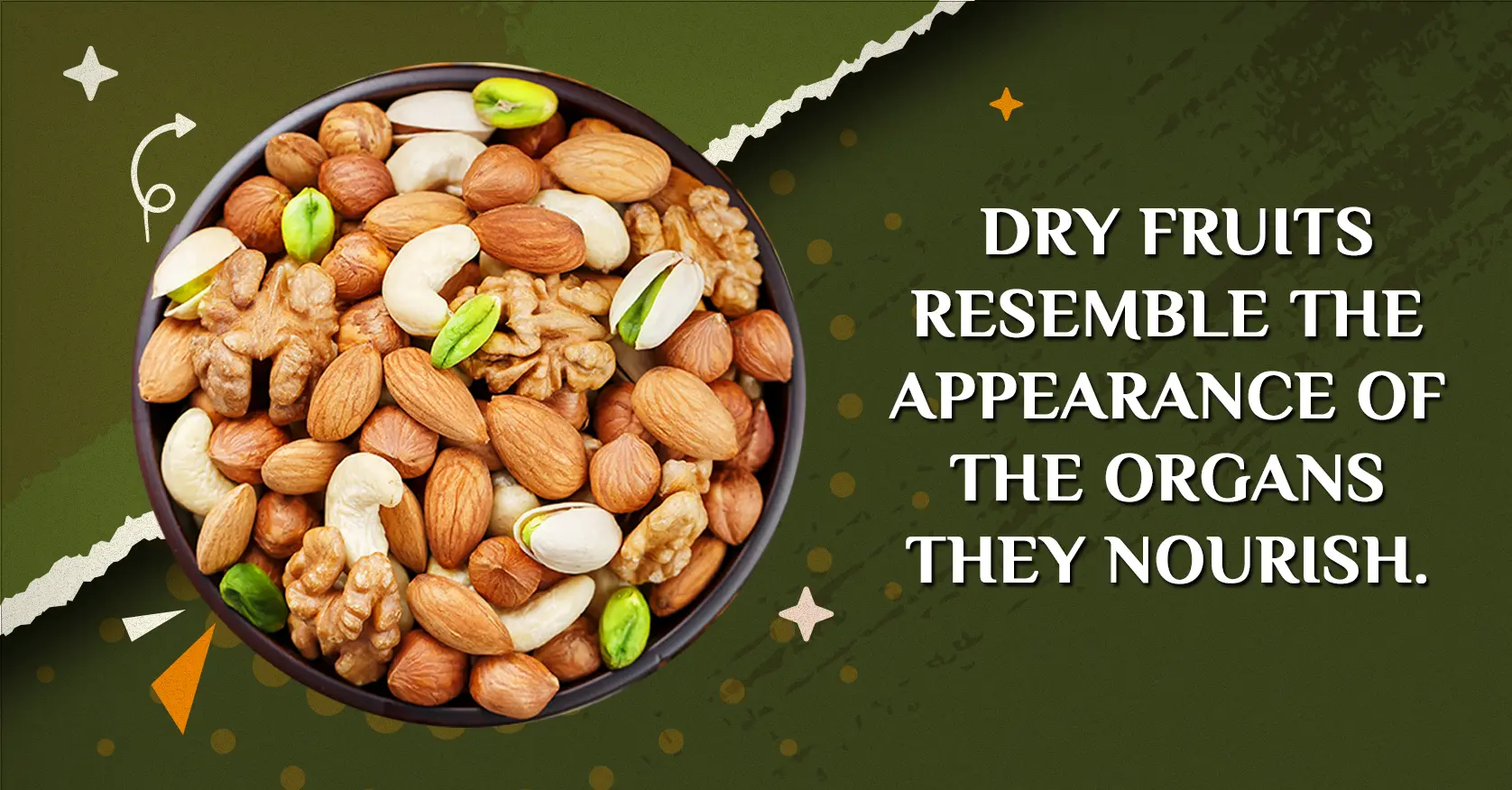Table of Contents
Subscribe to our Newsletter
Dry fruits resemble the appearance of the organs they nourish.

- By Parth Soni
- Satvic Sense
Dry fruits are an important part of a healthy diet. They are packed with essential vitamins, minerals, and nutrients that help maintain your overall health. But did you know that dry fruits actually resemble the appearance of the organs they nourish? This phenomenon is known as ‘Organic Mimicry’. This incredible resemblance between the dry fruits and the organs they nourish is not just a coincidence; it has scientific backing. Research has shown that dry fruits contain compounds and nutrients that are beneficial to the organs they resemble. This blog will explore the science behind this phenomenon and discuss the health benefits of different dry fruits. We will also look at the various ways in which you can incorporate these nutrient-rich foods into your daily diet. So, let’s dive right in!
Walnuts – Brains
Walnuts are a great source of nutrition for the brain. They are rich in omega-3 fatty acids, which are essential for brain development and maintenance. They are also high in antioxidants, which help protect the brain from oxidative stress. Walnuts are a great source of vitamin E, which can help improve cognitive performance and reduce age-related cognitive decline. Walnuts are also a good source of B vitamins, which can help improve memory, concentration, and focus. Eating walnuts can also help reduce inflammation in the brain, improving overall brain health. Walnuts also contain high levels of magnesium, which can help reduce anxiety and improve sleep quality. Eating walnuts regularly can help keep the brain healthy and functioning optimally. This is one of the most nutritious dry fruits that look like organs.
Buy Now: Kashmiri Snow White Walnuts Kernels/Giri
Raisins – Eyes
Raisins are one of the best snacks for promoting eye health. They are a rich source of antioxidants, including carotenoids, which can help protect against age-related macular degeneration, cataracts, and other vision problems. They also contain lutein and zeaxanthin, which are important for maintaining ocular health. Raisins are also high in vitamin A, which helps protect against night blindness and dry eyes. Additionally, they are a good source of potassium and boron, which can help reduce eye strain. Eating raisins can also help keep the eyes hydrated and reduce inflammation, which can be beneficial for those with eye allergies. In short, raisins are a delicious and nutritious snack that can help keep your eyes healthy.
Almonds – Kidneys
Almonds are a great source of nutrients for kidney health. They are packed with essential vitamins, minerals, and antioxidants that help protect the kidneys from damage and can even help reduce inflammation. Almonds are also rich in magnesium and potassium, which help to regulate kidney function and support kidney health. Additionally, the high levels of monounsaturated fatty acids in almonds can help to reduce bad cholesterol levels, which is beneficial for kidney health. Eating a handful of almonds daily may help reduce the risk of kidney diseases, such as kidney stones and chronic kidney disease.
Buy Now: Kashmiri Mamra Almond (Badam) Kernels
Pistachios – Lungs
Eating pistachios are great for the lungs. Pistachios are a rich source of vitamin E, which is known to help reduce the risk of asthma and other respiratory issues. They are also a good source of antioxidants, which help to protect the lungs from inflammation and other damage. Additionally, pistachios contain polyphenols, which can help to reduce the risk of lung cancer. Eating pistachios can also help reduce inflammation in the lungs and improve the body’s ability to fight off infection.
Dates – Intestines
Eating dates has many benefits for the intestines. Dates are a good source of dietary fibre, which helps promote regular bowel movements, reduce constipation, and prevent digestive diseases. Moreover, dates are rich in prebiotics, which are essential for maintaining a healthy balance of bacteria in the gut. Prebiotics help to promote the growth of beneficial bacteria, which in turn helps to improve nutrient absorption and digestion. Dates also contain high amounts of magnesium and potassium, both of which are important for maintaining a healthy balance of electrolytes in the body. The high levels of these minerals can help to protect the intestinal lining and reduce inflammation. Additionally, dates are a good source of antioxidants which can help to protect the intestines from damage caused by free radicals.
Apricots – Liver
Eating apricot is a great way to help promote healthy liver function. Apricot contains high levels of antioxidants which help protect the liver from free radical damage. The antioxidants found in apricot also help to reduce inflammation of the liver and can help to reduce the risk of cirrhosis and other liver diseases. Apricot is also rich in vitamin A, which helps to protect the liver from toxic substances. Eating apricot can also help reduce the risk of developing gallstones and improve gallbladder function. Lastly, apricot is a good source of dietary fibre, which helps to keep the digestive system functioning correctly and helps keep the liver healthy.
Buy Now:Kashmiri Dried Apricot(Khurmani)
Figs – Large Intestine
Figs are a nutrient-rich fruit that provides many health benefits, including those for the large intestine. Figs are an excellent source of dietary fibre, which is important for maintaining a healthy digestive system. This fibre helps to keep the large intestine clean and functioning properly. Figs are also a good source of prebiotics, which are beneficial bacteria that help promote a healthy gut balance. Additionally, figs contain phenolic compounds, which have antioxidant properties that help to reduce inflammation in the large intestine.
Prunes – Gallbladder
Prunes are a great food for promoting optimal gallbladder health. They are high in dietary fibre, which helps to reduce cholesterol levels and improve digestive regularity. Additionally, prunes are naturally high in sorbitol, an organic compound that helps stimulate the production of bile, which is essential for proper digestion. Prunes also contain compounds that can help break down gallstones, reduce inflammation, and protect the gallbladder from damage. Eating just a few prunes daily may help reduce gallbladder pain, improve regularity, and reduce the risk of gallstones.
Hazelnuts – Stomach
Eating hazelnuts can be beneficial for your stomach. Hazelnuts are packed with dietary fibre, which helps to keep your digestive system running smoothly. The fibre helps to keep you regular and can help prevent constipation. Hazelnuts are also rich in antioxidants, which can help reduce inflammation in the stomach. They also contain healthy fats, which help keep your digestive system functioning properly. Eating hazelnuts can help improve your overall gut health and can help to reduce the risk of diseases like Crohn’s disease and ulcerative colitis.
Conclusion
In conclusion, this was a list of organs that resemble dry fruits; the appearance of dry fruits is closely linked to the organs they nourish in the body. This is because the shapes and colours of these fruits closely resemble those of the organs they support. Not only does this give us a visual reminder of their importance, but it also serves to remind us that the food we eat can directly and positively impact our health. Therefore, it is important to ensure that we are incorporating a variety of dry fruits into our diets to ensure that we are nourishing our bodies in the best possible way.

